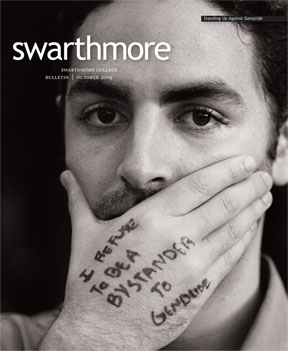A Different Perspective
A letter from Jim Weber ’84 in the July Bulletin expressed his opinion about President Alfred H. Bloom’s role in the elimination of the football program. I have a somewhat different perspective.
From 1982 to 1989, I was a member of the Board of Managers, serving as chair of the audit committee, vice chair of finance, and Board secretary. In 1989, I joined the College administration as vice president for business and finance. I worked for Al Bloom from 1991 until my retirement in 1995 and admired his efforts to engage all stakeholders on controversial subjects and to listen carefully in the Friends’ sense of seeking consensus.
The place of football at Swarthmore had been a subject of discussion for many years by the Board, faculty, staff, students, administration, and alumni. As I neared retirement, that discussion seemed to be trending toward the difficult decision to eliminate the program. Conditions were changing. Swarthmore had not grown in size as many small colleges had when they became coed schools, freshmen committed to the sport coming out of high school were not all participating as seniors, study abroad was impacting athletes, and specialization was making it more difficult to attract multisport students. It is not my purpose here to cover all the pros and cons of this discussion, but despite the evolving difficulties in fielding a team, there remained a number of very strong voices among the alumni who opposed discontinuing the program.
After I retired, the decision was made to begin a trial period of enhancements to the football program with a new coach, in-creased recruiting, and financial support.
I know that Al Bloom anguished over doing this, but with alumni pressure acting as critical catalyst, the decision was not his alone. Although some success resulted from the changes, it became clear that, in the long run, a viable football program consistent with Swarthmore’s drive for excellence in all endeavors would not be feasible. In 2000, the trial was ended, which unfortunately meant that there were coaches and students who could not continue on paths they had expected. Again, there was broad consultation.
With this background, I believe that a mistake was made in beginning such a trial but that at all points there was full consultation. Sometimes, time does not allow for complete consensus or even a “sense of the meeting,” which is a better phrase—and more appropriate in some situations. In this case, some alumni felt strongly that they had not been heard. They were indeed heard, but their position was not convincing. Once again, ending the football program was clearly not the decision of a single person.
I have always been a strong supporter of athletics at Swarthmore. I was a starter in baseball, basketball, and soccer, and received the Quink trophy in 1951. I believe it is necessary to maintain a strong role for athletics at the College. However, conditions change, and the ability to make adjustments must be a basic principle for a successful Swarthmore.
William Spock ’51
Brunswick, Maine
 Email This Page
Email This Page